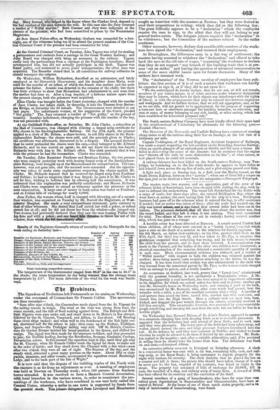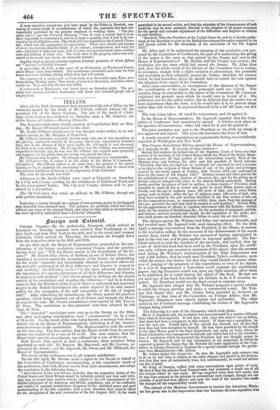'Utz Vrobinres.
The Squadron of Evolutions left Portsmouth on its cruise, on Wednesday, under the command of CommixIore Sir Francis Collier. The movements are thus recorded-
" Soon after nine o'clock, the Commodore made signal from the St. Vincent for the sailing-vessels to-weigh. The wind at the time was strong from East, the water smooth, and the tide of flood making against them. The Raleigh and Bril- liant frigates were soon under sail, and stood down to St. Helen's in line abreast, followed by the St. Vincent,, Vanguard, and Albion, in line ahead. Off Bmding these three ships tacked: and when well to the Southward of the Nab light ves- sel, shortened sail for the others to join; then came up the Rodney, Trafalgar, Queen, and Superb—the Trafalgar sailing very dull. Off St. Helen's, Commo- dore Sir Gordon Bremer hoisted his broad pendant in the Queen, and shifted her ensign. The signal was then made for the steamers tofollow, and they proceeded to „jom; the Terrible leading, having the Retribution, Scourge, Gladiator, Cyclops, Devastation astern. In this manner the squadron kept in line, until they got near the St. Vincent; when Sir Francis Collier made the signal for them to make sail in the order of battle; and they stood down the Chanuel with a fair wind—soon after two o'clock they were all out of sight. The fineness of the day,_ and the steady wind, attracted a great many persons on the water. About fifty or sixty yachts, steamers, and other vessels accompanied the squadron round Bembridge Ledge, and to the back part of the Isle of Wight."
It is now said that the dispute of the building trades of the North with the masters is as far from an adjustment as ever. A meeting of employers was held at Newton on Thursday week; when 188 persons from fourteen towns attended. It was resolved to form a Masters Central Association, with local branches in the various towns, in order to counteract the pro- ceedings of the workmen, who have combined in one vast body called the Central Union, whereby a strike in one town is supported by funds from the general stock. Ton joiners delegated from Liverpool and Manchester
sought an interview with the masters at Newton: but they were desired to send their propositions in writing; which they did on the following day. The great difficulty appears to be a " declaration " which the employers require the men to sign, to the effect that they will not belong to any general trades-union. The delegate joiners required this " declaration " to be withdrawn; but the Committee of the masters refused. So the strike continues.
Other accounts, however, declare that considerable numbers of the work- men have signed the "declaration," and resumed their employment.
At Birmingham, the differences seem in a fair way of settlement; the masters having assented to withdraw the "declaration," and offered to take back the men at the old rate of wages, "requesting" the workmen to declare that they do not support "any branch of the building trade that is at pre- sent 'out on strike,'" and leaving the question of advanced remuneration to some of the more skilful hands open for future discussion. Many of the strikers have resumed work.
The "declaration" of the Newton meeting of employers has been pub- lished: the first section of it is of such a nature that workmen can hardly be expected to sign it, or if they did to act upon it-
" We the undersigned do hereby declare, that we are not, or will not remain, members of any trades-unions, or of other societies under whatever designation they may be known, which have for their objects any interference with the nghta of labour, or with the arrangements that may be entered into between employers and workpeople. And we further declare, that we will not appropriate, and, as far as we are able, will not permit to be appropriated, for the purpose of supporting a tarn-out here or elsewhere amongst the building branches, or otherwise, any sum or sums of money belonging to any sick, burial, or other society, which has been established for benevolent purposes only."
The South-eastern Railway Company have most kindly offered their spare land in the neighbourhood of Canterbury for allotments for the labouring poor.— Kentish Observer.
The Directors of the Newcastle and Carlisle Railway have commenced running cheap trains to all the stations along their line on Sundays, at the low rate of a halfpenny per mile.
Captain Coddington, of the Royal Engineers, Assistant Inspector of Railways, has made a report respecting the late accident on the Brandling Junction Railway, when an engine plunged off an embankment at Shields and fell upon a house. He failed in discovering the cause of the disaster; but he surmises that the engine was "thrown off the rails by some obstruction on the line"; of what nature, or how placed there, he could not ascertain.
A railway-labourer has been killed on the South-eastern Railway, near Tun- bridge, by wandering on to the line while drunk: he appears to have fallen or laid himself down across the up-line of rails, and a pilot-engine passed over him.
A fight took place on Sunday last, in a field near the Marley tunnel, on the South Devon Railway, between two "navvies": when one of them fell a corpse on the spot,just as he received a blow from his antagonist—Devonport Telegraph.
The master, mate, two seamen, and an apprentice, part of the crew of the schooner Helen of Sunderland, have been charged with sinking the ship, with in- tent to defraud the underwriters. The vessel left Sunderland for the Baltic with a cargo of coals; but three days after, she entered Bridlington Bay, where she went down at anchor, the crew having first left the ship in a boat. Bridlington boatmen had gone off to the schooner when it entered the bay, to offer assistance if needed; but no notice was taken of them: after the coals had washed out, the ship was towed mhos, and it was found that several holes had been cut in the bottom. The prisoners declared, that all they knew about the matter was, that the vessel leaked, and they left it when it was sinking. They were committed for trial. Two others of the crew are not in custody; having entered another ship, which has gone on a voyage.
A horrible crime has been detected at Runcorn. A couple named Pirolett had three children, all of whom were entered in a "burial society,"—a club which pays a slim on the death of a member to the relatives for funeral expenses. On the 6th March, an infant died suddenly; on the 21st, another child died; on the 27th April, the third was very ill, and was taken to Mr. Pye, a surgeon: this gentleman suspected that something was wrong, and he took means to remove the child from the parents and to have them arrested. A communication was made to the Coroner, and the bodies of the other two children were disinterred; a chemical examination of the remains detected a considerable quantity of arsenic in each case. Much circumstantial evidence was adduced, and a verdict of " Withal murder" with respect to both the children was returned against the mother: there being merely some suspicion attaching to the father, he was dis- charged. It has been found that arsenic was also administered to the child who was rescued from the unnatural parent by Mr. rye; so the WOUIBil stands charged with an attempt to poison, and a double murder.
An occurrence at Bedford, last week, proves that "Lynch law," administered with the greatest brutality, is not exclusively a Transatlantic crime. A hlr. Barnard, apparently a coal-merchant, has been annoyed by impertinent addresses to his daughter, for which one ardent suitor has been sent to prison : another got into Mr. Barnard's house on Wednesday week, and entering a yard at the back, was encountered by Mr. Barnard; who, after some words had passed, beat the intruder with a stick, a son of the assailant assisting with a whip. A number of coal-porters then seized the lover, tarred him, covered him with coal-dust, and thrust him into the High Street. Here a ruffianly mob set upon him, beat, kicked, and dragged the poor wretch through the streets, seemingly resolved to kill him outright. This catastrophe, however, was prevented by some respectable people interfering and rescuing the man from the mob, but not before he was in a ternble plight. On Wednesday last, Bernard Mahon, of St. John's Market, appeared in answer to a summons charging him with dressing fowls so as to resemble pheasants. It appeared that the defendant had sold several of these fowls, and in each case said they were pheasants. The lower jaws of the fowls had been taken away, red wafers placed around the eyes, and large pheasant feathers introduced into the tail. In his defence, he said they were common in Dublin; and wished to know whether he might be allowed to do them if desired by his customers. Mr. Rush- ton replied in the negative; and, after a suitable admonition, said, if he persisted in selling them he Should take his licence from hire. The defendant was fined 52. and costs.—Liverpool An extensive robbery occurred in Liverpool on Saturday afternoon. A clerk in a commercial house was sent with a tin box, containing bills, cash, and rail- way scrip, to the Royal Beek; it being customary to deposit property for the night with bankers for secnrity. The clerk declares that he placed the box on a counter and left it there; the person who should have taken charge of it says he never saw it; the box, emptied of its contents, was found at night in the street. The property lost consisted of bills of exchange for 22,000L, 47/. in cash, the manifest of a ship, and railway scrip of many lines. A reward of 200/. has been offered for its recovery and the conviction of the thief.
Several members of a gang of housebreakers, who have for some time one flitted great depredations in Somersetshire and Gloucestershire, have been rested at Bristol. At the house of one of them much stolen property, and a 119 riety of instruments of housebreaking, were found. A most extensive seizure has just been made by the Police in Norwich, con- sisting of various kinds of manufactures, of which the materials had been sys- temstically purloined by the persons employed in working them. "The pro- perty taken," says the Norwich Mercury, "was of such a variety that it is al- moit impossible to enumerate it, and in so large a quantity that it had to be con- veyed to the Guildhall in carts. The whole of it was deposited in the Council Cham- ber; which bore the appearance of a great mart. There were shawls and dresses of every description—handkerchiefs of all colours, manufactured and ready for eale—all kinds of silks and yarn, both in a raw and manufactured state—besides reels and bobbins of every size. The total value of the property taken was esti- mated to be worth very nearly one thousand pounds."
Appleby Gaol at present contains eighteen criminal prisoners, of whom fifteen are " navvies."—Carlisle Journal.
A prize-fight for 2501. a side came off on Wednesday at Wychwood Forest, about fifteen miles from Oxford. The combatants pummeled each other for four hours and seven minutes, during which they had 160 rounds.
The contents of a stack-yard at Crawcrook, near Newcastle-upon-Tyne, were burnt during Monday night. Nine stacks of corn were destroyed, and three others nearly so. It is said that the fire was wilful.
A cotton-mill at Manchester was burnt down on Saturday night. The pre- mises were insured, but their destruction will throw two hundred people out of employment.



























 Previous page
Previous page